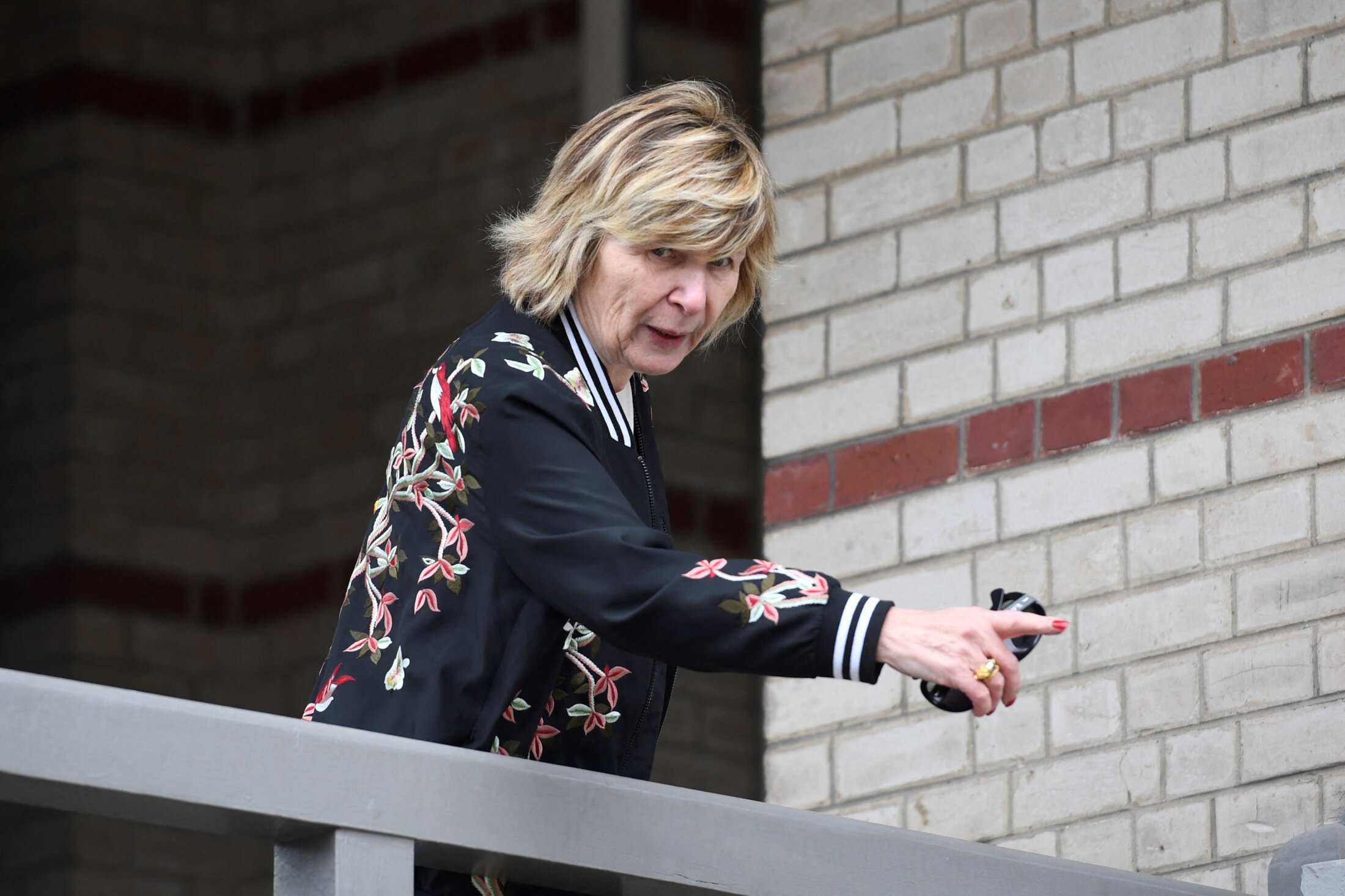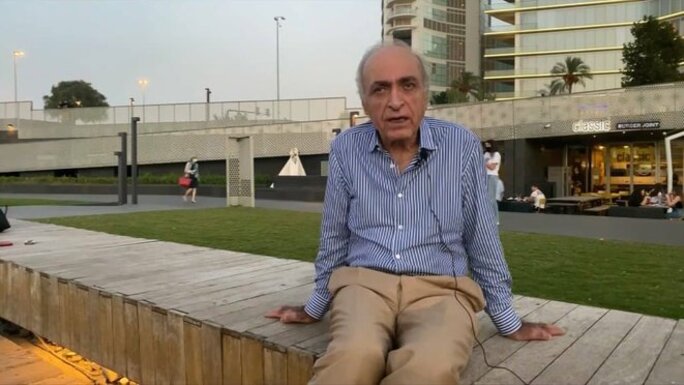Paparazzi agency boss Michèle Marchand, a powerful figure in the French gossip press and an influential PR fixer to politicians, was on Saturday placed under formal investigation for witness tampering in relation to a judicial investigation into the suspected Libyan financing of Nicolas Sarkozy’s 2007 presidential election campaign.
Marchand, nicknamed “Mimi”, was also placed under investigation for “criminal conspiracy” to commit fraud with others. Under French law, a person can only be placed under investigation if a magistrate establishes serious and – or – concurring evidence that they committed a crime.
The witness in question is French-Lebanese businessman Ziad Takieddine, a key figure in the Libyan funding investigation, who last November gave an interview to French weekly Paris Match, and appeared in a brief video broadcast by French news channel BFMTV, in which he withdrew his previously detailed accusations that Sarkozy’s 2007 campaign was funded with cash by the regime of the late Libyan dictator Muammar Gaddafi, and which Takieddine himself helped deliver to Paris.
In the now eight-year-old probe into the suspected funding of his campaign by the Gaddafi regime, Sarkozy, 66, is formally placed under investigation for “corruption”, “illicit funding of an election campaign”, “receiving misappropriated public funds”, and “criminal conspiracy”. Three of his former ministers – Brice Hortefeux, Claude Guéant and Éric Woerth – are also placed under investigation. They, and Sarkozy, deny wrongdoing.

Enlargement : Illustration 1

Marchand, 74, a confidant of Sarkozy and his wife and who played an active PR role in Emmanuel Macron’s election campaign, becoming close also to the French president and his wife, was arrested on Thursday and taken into custody for questioning at the offices of the anti-corruption and financial crime police agency OCLCIFF. She was placed under investigation on Saturday after 48 hours of questioning, and bailed. Her lawyer, Caroline Toby, said Marchand “firmly denies” the accusations against her.
Four other people also taken into custody for questioning on Thursday were placed under investigation on Saturday.
The case against Marchand centres on negotiations leading up to the interview last year with Takieddine in the Lebanese capital Beirut, from where he made his surprising retraction. Takieddine, who during the 2000s served as a business and diplomatic intermediary for Sarkozy’s political team, notably in Arab countries, fled to Lebanon last year after a Paris court handed him a five-year jail term for his part in a separate illegal kickbacks scam involving French arms sales to Pakistan and Saudi Arabia.
In his interview with Paris Match, Takieddine insisted that Sarkozy did not personally receive cash from Tripoli, contrary to his previous, longstanding claims made both before French investigating magistrates and also in a video interview with Mediapart, in which he described delivering the sums in suitcases. But in an account that appeared contradictory and at times muddled, he maintained that Sarkozy’s then chief of staff Claude Guéant did receive the cash from Libya.

Enlargement : Illustration 2

In the short video of him, broadcast on BFMTV and filmed by a photographer linked to Michèle Marchand, he began by saying, “I confirm that it's not true”, although apparently unprompted by a question. “Mr Sarkozy did not have Libyan financing for the presidential campaign, neither could Mr Gaddafi have done it because he never did it,” he added.
However, Takieddine’s previous and repeated testimony to the judicial investigation of how the Libyan funds were delivered to Paris before and after 2007 has been largely substantiated, including by other witness statements and documents.
The surprising interview with Takieddine published last November was immediately seized upon by the former French president and a number of his allies as proof of his innocence and the weakness of the case against him. “The truth has finally come out,” wrote Sarkozy on Twitter on November 12th.
The placing under investigation of Michèle Marchand, who runs a paparazzi agency called Bestimage, is all the more embarrassing for Sarkozy in that Takieddine’s U-turn was published in Paris Match, which is owned by the Lagardère media group, on whose supervisory board Sarkozy sits. That constitutes in itself a link between the interests of the former president and the editorial content of the group’s flagship weekly.
Paris Match journalist François Delabarre, who was sent to Beirut to carry out the interview with Takieddine, was also arrested and taken into custody for questioning on Thursday, but was released by OCLCIFF hours later that same day without any further action taken against him. The weekly’s publishing editor, Constance Benqué, denounced the arrest of Delabarre as “contrary to all democratic principles”, and she described the move as “a form of intimidation” and a “violation of the rights and freedom of the press”.
The witness tampering investigation was handed to two magistrates by the French public prosecution services’ financial crime branch, the PNF. Under France’s criminal code, witness tampering, or subornation, is defined as “the use of promises, offers, gifts, pressure, threats, assaults, manoeuvres or trickery […] in order for others to make or deliver an untrue statement, testimony or attestation”. The crime carries a sentence of up to three years in jail. A crime of “criminal conspiracy” to commit fraud is punishable by a minimum five-year jail term.
In the investigation into the circumstances of Takieddine’s retraction, investigators also took into custody for questioning other individuals suspected, along with Marchand, of variously influencing and staging the intermediary’s turnaround. They are Noël Dubus, a convicted fraudster, Pierre Reynaud, a property dealer, and Arnaud de la Villesbrunne, a former associate director of PR firm Publics who worked on Sarkozy’s unsuccessful re-election campaign in 2012. All three were on Saturday also placed under investigation, like Marchand, for witness tampering and criminal conspiracy, along with a woman associated with Dubus.

Enlargement : Illustration 3

Dubus and Reynaud are reportedly close to the entourage of Alexandre Djouhri who, like Takieddine, was another intermediary and a key suspect cited in the investigation into the suspected Libyan funding of Sarkozy’s campaign.
“My client has hardly understood the terms of his placing under investigation, which he in any case contests and he will attempt to explain that when he will be questioned later,” said Arnaud de la Villesbrunne’s lawyer, Eric Morain, on Saturday.
As Mediapart has previously reported, a former lawyer acting for Takieddine in Lebanon, Hani Mourad, said an intermediary had promised Takieddine that “he was going to bring him 5 million euros” if he changed his testimony against Sarkozy.
Mediapart has been told by several sources that the contact with Takieddine, after he had fled to Lebanon, to persuade him to publicly change his account was first made by Dubus. He travelled to Beirut twice last year to meet with Takieddine, firstly in October, when the interview with Paris Match was in preparation, and the second time in December, when Takieddine formally retracted his accusations against Sarkozy in writing in an incoherent document signed at the offices of a solicitor – and which was also reported by Paris Match.
In a past interview with Mediapart, Dubus said that during that period he sent a sum of 8,000 euros to Takieddine’s lawyers. Mediapart understands that he received a sum of around 300,000 euros, through the intervention of Arnaud de la Villesbrunne and via two offshore bank accounts held by Pierre Reynaud.
On January 14th this year, Takieddine was finally questioned in Beirut about his retraction by the two magistrates in charge of the Libyan funding probe, when he told them that his words had been “deformed” by Paris Match. “I do not confirm these remarks which had been badly turned [around] by the journalist,” he said in his statement. “Don’t forget that Paris Match belongs to a friend of Sarkozy’s.”
Mediapart contacted individuals close to Takieddine in Beirut, one of whom said that Michèle Marchand was “in charge of the publication of the article” in which the intermediary retracted his accusations against Sarkozy. Appearing to support that allegation was the fact that the accompanying photos and the video broadcast on BFMTV were shot by Sébastien Valiela, a photographer who regularly works with Marchand’s agency Bestimage.
Marchand insisted that she had “nothing to do with this business” when questioned by Mediapart earlier this year. “Valiela works for me from time to time, but he has his own agency,” she said. “He went off [to Lebanon] to try and do a paparazzi story on [fugitive former Renault-Nissan boss] Carlos Ghosn and, apparently, the other one [Ziad Takieddine] jumped onto him. He wanted photos. Valiela tells me that he spoke with [Paris Match editorial director, Hervé] Gattegno, who straight away sent him a journalist.”
But that account changed on Saturday after Marchand was placed under investigation, when her lawyer, Caroline Toby, told French news agency AFP that her client had “acted in her position as a journalist who had the exclusivity for this interview with Mr Takieddine”, adding: “She did nothing more than organise the photos and the interview, within the boundaries of her profession.”
While Paris Match has so far not been the object of legal action, it is in the embarrassing situation of having acted as the relay for what is at best a questionable operation that briefly served the interests of Sarkozy, who has been placed under investigation in several judicial probes, and who sits on the supervisory board of the magazine’s owners.
In an interview with French daily Le Monde in July 2020, Lagardère Group boss Arnaud Lagardère expressed his satisfaction that his group’s publications, and notably weekly Le Journal du dimanche, adopted an editorial line of vigorously defending Sarkozy in their reporting of the Libyan funding scandal. “If that can re-balance the coverage of this affair in the press, that’s good,” he told the daily.
In January 2020, following the extradition to France from Britain of fugitive intermediary Alexandre Djouhri, the magistrates in charge of the Libyan funding investigation wrote a report setting out their reasons for the placing of Djouhri in preventive detention. The document was addressed to a judge responsible for ruling on the detention of suspects. The magistrates cited the pressure Djouhri “does not hesitate” to exercise on his “interlocuters”, and notably his “manipulation” of the media. They underlined his particular closeness with Hervé Gattegno, the editorial director of Paris Match and the Journal du Dimanche. The latter publication notably once described the Libyan illegal funding investigation as a “machination”. Gattegno, meanwhile, denies any influence interferes with his professional activity.
Sarkozy’s legal woes are far from limited to the 2007 campaign financing probe. In March, a Paris court found the former president guilty of corruption and influence peddling for offering a magistrate support for a comfortable posting to Monaco in exchange for confidential information about the progress of a separate political funding case. Sarkozy was handed a three-year prison term, two of which were suspended, which he is now appealing.
Meanwhile, he is one of the defendants in an ongoing trial in Paris into the fraudulent financing of his 2012 re-election campaign, involving alleged fake invoices to hide the illegal overspending of the campaign.
-------------------------
If you have information of public interest you would like to pass on to Mediapart for investigation you can contact us at this email address: enquete@mediapart.fr. If you wish to send us documents for our scrutiny via our highly secure platform please go to https://www.frenchleaks.fr/ which is presented in both English and French.
-------------------------
- The French version of this report can be found here.
English version by Graham Tearse


